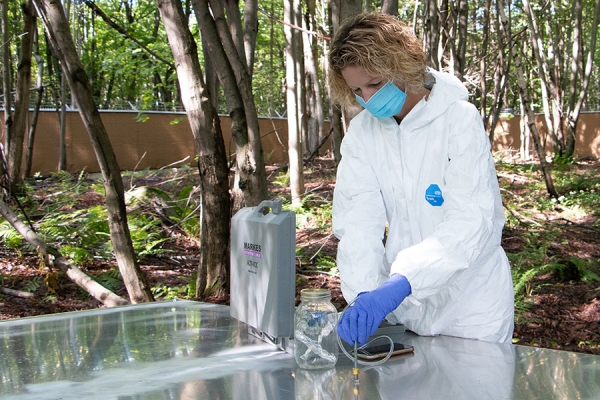 Professor Shari Forbes collects decomposition odour to identify the key compounds that cadaver dogs alert to.
Professor Shari Forbes collects decomposition odour to identify the key compounds that cadaver dogs alert to.
The Faculty of Science continues to grow in research strength and reputation with the latest addition of superstar faculty members, says Chris Houser, dean of science, currently serving as interim vice president research and innovation.
Seven faculty members from various areas of expertise will join five departments.
“The strength and strategic importance of their research and scholarship helps to strengthen the reputation of the Faculty of Science as a leader in impactful research.” says Dr. Houser.
This January, the faculty will welcome four researchers.
Hannah ter Hofstede will be a new integrative biology assistant professor. Her research is in the field of sensory ecology, which investigates how animals gain and use information about their environment.
Dr. ter Hofstede is most interested in understanding how animals like bats and insects use sound to orient in their habitat, find food, or attract mates. She uses a combination of methods to address research questions in her studies, such as neurophysiological recordings from the ears of insects to determine what they can and can’t hear, controlled behavioral experiments in the lab to identify responses of animals to sounds, and observational field studies to document natural behavior in the wild.
Vijendra Sharma, assistant professor biomedical sciences intrigued by the brain’s functional complexity, focused his research on studying the biology of mRNA translation (protein synthesis) and its regulatory mechanisms in different cell types to uncover the molecular and cellular basis of learning and memory. He expertized in a wide array of cutting-edge techniques to investigate the molecular and cellular mechanisms underlying synaptic plasticity and memory formation.
Dr. Sharma’s research utilizes a combination of behavioral, electrophysiological, and biochemical approaches to dissect the role of different cell types and neural circuitry in health and disease. He also patented a gene therapy-based therapeutic approach to treat dementia associated with aging and Alzheimer's disease by correcting dysregulated translation in affected brain regions.
Brian DeVeale, assistant professor biomedical sciences, has a long-standing interest in the gene expression defining cell types. Through his studies, he acquired expertise in developmental biology, gene regulation, functional genomics, and bioinformatics. Moving forward, the goal of his research program is to understand how cell cycle pathways impact cell fate specification and function. To pursue this goal, Dr. DeVeale will develop molecular and computational approaches.
Shari Forbes joins the chemistry and biochemistry team as a full professor. The forensic chemist and taphonomist studies the biochemical processes of human decomposition. Her current research focuses on identifying an accurate chemical profile of decomposition odour using multidimensional chromatography.
Dr. Forbes’ research assists police canine units to improve their training protocols for cadaver-detection dogs deployed to forensic and mass disaster investigations. Her expertise is regularly requested to assist law enforcement with locating and recovering buried or concealed evidence, including human remains, drugs, weapons, and currency.
“I am excited to be joining a multidisciplinary team and to further enhance the reputation of the forensic science program at the University of Windsor,” says Forbes.
“With the support of the university, I am hoping to establish the first human decomposition facility in Ontario which will offer unique research and training opportunities for our students and partner law enforcement agencies.”
Three new faculty already joined the science team in July in economics and mathematics and statistics. Steven Ruoyu Chen joined the Department of Economics as an assistant professor in this summer after completing his Ph.D. in economics at the George Washington University in Washington, D.C.
As an applied microeconomist, Dr. Chen specializes in environmental and energy economics, with a keen interest in the effectiveness of policies in climate change mitigation and renewable energy adoption. His research primarily focuses on advancing our understanding of the effectiveness of carbon emissions trading in restricting power sector emissions.
Tom Grondin (BA 1992), learning specialist, AAS IV in mathematics and statistics, will be managing the department’s actuarial science programs. Grondin has nearly 30 years’ experience as a qualified actuary, including over 20 years at the executive level. The actuary is a consultant to the Aegon financial services group and a fellow of the Society of Actuaries and has an honours degree in mathematics from the University of Windsor.
Kevin Granville, assistant professor mathematics and statistics, has a variety of research interests that span areas of applied probability, stochastic processes, and environmetrics. He has expertise in queueing theory, which involves the modeling and analysis of complex queueing systems that describe the process of how customers wait to receive service.
Dr. Granville has also conducted much research in the field wildland fire science, including studies into the impacts of forestry regulations in Ontario on fire suppression effectiveness as well as the odds of forestry operations igniting fires.
—Sara Elliott
